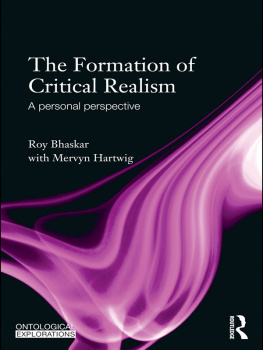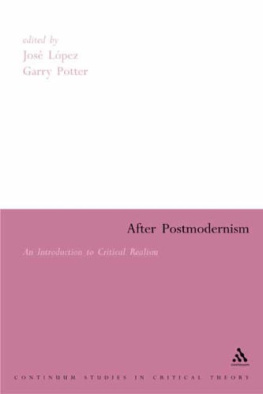Against the Spiritual Turn
The argument presented in this book is that the recent spiritual trajectory of Roy Bhaskars work, upon which he first embarked with the publication of his From East to West, undermines the fundamental achievements of his earlier work. The problem with Bhaskars new philosophical system (transcendental dialectical critical realism, or simply meta-reality), from the critical-realist Marxist perspective endorsed here, is that it marks both a departure from and a negation of the earlier concerns of Bhaskar to develop a realist philosophy of science and under-labour for an emancipatory materialist socio-historical science.
In opposition to theist ontological logics more generally (including the rather more rational theism presented by Margaret Archer, Andrew Collier and Doug Porpora), the argument of this book is that the earth-bound materialist dialectics of the classical Marxist tradition, and the naturalistic humanism these dialectics under-labour on the terrain of socio-historical being, offer a much more promising way forward for critical realist theory and for liberatory politics and ethics.
Sean Creaven is a Senior Lecturer in Sociology at the University of the West of England (UWE).
Routledge Studies in Critical Realism
Some other books in the series:
Maurice Mandelbaum and American Critical Realism
Edited by Ian Verstegen
Contributions to Social Ontology
Edited by Clive Lawson, John Spiro Latsis, Nuno Miguel Ornelin Martins
Critical Realism, Post-positivism and the Possibility of Knowledge
Ruth Groff
Emergentist Marxism
Dialectical philosophy and social theory
Sean Creaven
Engendering the State
The international diffusion of womens human rights
Lynn Savery
Explaining Global Poverty
A critical realist approach
Branwen Gruffydd Jones
Ontology of Sex
Carrie Hull
Revitalizing Causality
Realism about causality in philosophy and social science
Edited by Ruth Groff
Against the Spiritual Turn
Marxism, realism and critical theory
Sean Creaven
First published 2010
by Routledge
2 Park Square, Milton Park, Abingdon, Oxon OX14 4RN
Simultaneously published in the USA and Canada
by Routledge
270 Madison Avenue, New York, NY 10016
Routledge is an imprint of the Taylor & Francis Group, an informa business
2010 Sean Creaven
Typeset in Time New Roman by
Taylor & Francis Books
Printed and bound in Great Britain by
the MPG Books Group
All rights reserved. No part of this book may be reprinted or reproduced or utilised in any form or by any electronic, mechanical, or other means, now known or hereafter invented, including photocopying and recording, or in any information storage or retrieval system, without permission in writing from the publishers.
British Library Cataloguing in Publication Data
A catalogue record for this book is available from the British Library
Library of Congress Cataloging in Publication Data
Creaven, Sean, 1963
Against the spiritual turn: Marxism, realism, and critical theory/ Sean
Creaven.
p. cm.
Includes bibliographical references.
1. Bhaskar, Roy, 1944- 2. Critical realism. 3. Spiritualism. 4. Religion
Philosophy. I. Title.
B5134.B483C74 2009
181.4-dc22
2008046755
ISBN13: 978-0-415-49031-3 (hbk)
ISBN10: 0-415-49031-6 (hbk)
ISBN13: 978-0-203-87843-9 (ebk)
ISBN10: 0-203-87843-4 (ebk)
This is for my son, Alistair, with love
Contents
Roy Bhaskars critical realism has been in the ascendant in the Western academy in recent decades. There are two main reasons for this. First, Bhaskars philosophy articulates a theoretically coherent alternative to the traditional dualisms of the philosophy of science (positivism, rationalism, relativism and pragmatism) and social-science theory (atomism, holism, postmodern-style linguistic reductionism, etc.). Second, Bhaskars philosophy articulates a theory of emancipatory critiques (judgemental rationalism) that allows a productive solution to the fact-value dualism that has bevelled traditional philosophy of social science, providing epistemological grounds for both critical social theory (aimed at diagnosing the sources of human oppression and alienation) and emancipatory political projects (aimed at transcending alienated or oppressive social structures).
The argument presented in this book is that the recent spiritual trajectory of Roy Bhaskars work, upon which he first embarked with the publication of his From East to West, undermines the fundamental achievements of his earlier work. This is a serious matter since Bhaskar, as the founder and figurehead of critical realism, is the name most associated with this research tradition in the wider academic world, and his ideas retain considerable influence within the critical-realist research community. The problem with Bhaskars new philosophical system (transcendental dialectical critical realism, or simply meta-reality), from the critical-realist Marxist perspective endorsed here, is twofold. First, it marks a departure from the earlier concerns of Bhaskar to develop a realist philosophy of science and under-labour for an emancipatory materialist socio-historical science. Second, and more seriously, it stands in considerable tension with these earlier goals. This is because Bhaskars new philosophy situates the dialectic of human freedom outside society and history in the self-realization of the self-subsistent subject, and decentres the regulative function of analytical reason and scientific knowledge in favour of a new emphasis on intuitive realism, subjectivism and transcendentalism in establishing the reality of objects of knowledge.
The end-result is a meta-philosophy which is irrealist, speculative, under-theorized, internally self-contradictory, and which cannot provide philosophical guidance to liberatory social practices. In opposition to transcendental idealist or theist ontological logics more generally, including the rather more rational theism presented by the critical-realist scholars Margaret Archer, Andrew Collier and Doug Porpora, the argument of this book is that the earth-bound materialist dialectics of the classical Marxist tradition, and the naturalistic humanism these dialectics under-labour on the terrain of socio-historical being, offer a much more promising way forward for critical-realist theory. These also permit the articulation of a defensible moral realism, and for a universal politics of human freedom from oppressive social systems.
Several people have provided me with invaluable support and assistance with this project. Thanks to my wife, Patricia, for permitting me to colonize the family PC at a moments notice (in the final editing stages of this project), and for remaining my friend, despite the travails of our separation. Thanks to my son, Alistair, for preserving my sanity over the past six months, by forcing me to reflect on matters rather more interesting than the demerits of absolute idealism in philosophy and politics such as the fascinating matter of whether Daleks or Cybermen are the fiercer or scarier Dr Who monster. Thanks to my good friend Victoria Newton, for providing me with some interesting ideas to mull over with regard to religious sensibility as a psychological phenomenon. Thanks to my employers, the University of the West of England, for granting me the study leave to complete this research (despite my usual failed bid for research funding which would have financed teaching cover).






